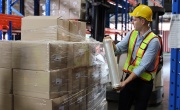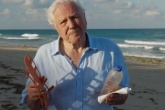Ahead of the pack: An interview with Paul Vanston
As a huge year for resources kicks off with a plastics-heavy 25 Year Environment Plan, INCPEN CEO Paul Vanston talks to Edward Perchard about deposits, PRNs, Attenborough and how effective collaboration will pave the way for a greener future

It’s set to be a massive year for the packaging industry, and the product supply chain as a whole. As the government develops a specific Resources and Waste Plan (due towards the end of the year) and responds to the growing public demand for action on plastics, the pressure is on to ensure that long-term goals are converted into sustainable action.
Speaking to Resource a few days after the long-awaited launch of the government’s 25 Year Environment Plan, Paul Vanston, Chief Executive of the Industry Council for Packaging & the Environment (INCPEN), admits that it’s been a whirlwind start to the new year.
The decision to appoint Michael Gove, a man with a (shall we say) spotted environmental track record, as Environment Secretary last June turned quite a few heads, but several months on, they remain turned, with more top-level and national focus on environment policy than was ever mustered by his immediate predecessors. “I’m clear we must not tolerate our global lands and oceans being used as unauthorised waste sites,” says Vanston. “Whilst many of us have held that view for a long time, it does feel as though we now have a Secretary of State who is committed to making swift progress on issues where our sector can play important roles.”
This desire for swift progress has certainly been boosted by a public firmly under the Attenborough Effect: online searches for plastic recycling and ocean conservation charities surged following an episode of the venerable broadcaster’s Blue Planet II series looking at man’s impact on the marine ecosystem. “Our industry must ride this wave of public and political interest in our environment,” says Vanston. “I will work intensively with the government, WRAP, and across four sectors – packaging supply chain, local government, waste and resources management, and reprocessors – to build traction on changes in our value chain that help deliver the goals of the 25 Year Environment Plan.”
Coincidentally, it was just a few weeks before Gove assumed office that Vanston took over the top seat at INCPEN, stepping into the private sector after almost three decades in public service. Reflecting on a busy first few months in his new role, Vanston says: “I’m not a packaging technologist, which means my appointment was to bring different experience and skills to the role. Something that has been validated for me is that collaboration is really hard work, especially between sectors. So many things have to fall into place for truly effective, and genuine, partnership working to get going. I do feel that we have an array of exceptional leaders in key roles at the moment where real progress can be made.”
For all the welcome focus on plastics, much of the discourse in the national press has bordered on the polemical, shaming supermarkets and producers for the ubiquity of plastic packaging, which in most cases performs essential roles in protecting products and the energy that has gone into making them. Does the packaging industry need to fight back? “Actions speak louder than words, so I feel the whole packaging value chain, and government, needs to work harder at joining up our goals and how we meet them,” Vanston concedes. “In my view, no one should be allowed to exempt themselves from being an active player in protecting our environment. The public and media have roles to play in highlighting actions that need to be taken – but I also feel they can do more to highlight how all parts of society need to act.”
The 25 Year Environment Plan established a number of goals, the achievement of which will require collaboration across those four sectors to ensure that balance is struck and that short- term gain does not come at a long-term cost. “I think whatever programme we pull together could be called ‘The Attenborough Accord’. This could be our sectors’ collective contributions to the 25 Year Plan. Going one step further, wouldn’t it be fantastic if our sectors could agree potential solutions by the time of the Commonwealth Heads of Government Meeting hosted by the Prime Minister in the UK in April? Having the four sectors’ collective solutions, including striking a deal on packaging recovery note (PRN) reform, would be a great step forward in meeting the international need for environmental protection.”
With support for so many measures – a deposit return scheme (DRS), charges on disposable coffee cups, taxes on single-use plastics – swirling around at the beginning of this year of policy development, it is changes to the PRN system that Vanston seems most keen on. “After advocating reform of the PRN system for the best part of the last decade along with many others, we now seem to have cross-sector support for getting on with it. Leaders from across the packaging supply and management chain all wish to participate in PRN reform discussions right now.
“We need a much smarter PRN system that incentivises recyclability and recycled content. Councils need transparent financial support and PRN reform can incorporate that. Citizens need really brilliant, long-term communications on the waste hierarchy based on a nationally consistent approach. I believe PRN reform can tackle that too. The saying goes, ‘strike while the iron is hot’. I’m hopeful all four sectors wish to get down to the hard yards of negotiations and strike a deal on PRN reform.”
Changes to producer responsibility obligations were recommended in the two Environmental Audit Committee reports stemming from the Parliamentary group’s major inquiry into disposable packaging, suggesting in particular ‘a producer responsibility compliance fee structure that rewards design for recyclability and raises charges on packaging that is difficult to recycle’. However, what took the headlines were further calls for a DRS – a measure that would have a profound effect on how drinks packaging is consumed and treated, and that has in the past been a sour point for the packaging industry.
While Vanston’s predecessor at INCPEN, Jane Bickerstaffe, was a vocal detractor of the idea of a UK DRS, writing for Resource that it could undermine existing recycling services and that there was no evidence it would improve litter levels, Vanston himself is willing to listen, though he still thinks other avenues would be more fruitful for improving plastic capture: “There’s no doubt that the campaigning for deposit return schemes has been loud and effective. Personally, I’m neutral on deposit returns as it’s an input to the system, not an outcome. I prefer to look at what outcomes we’re trying to achieve and then assess all options together. The Prime Minister was asked about DRS at the launch of the 25 Year Environment Plan and she said it’s best to look at all the evidence and see what makes the best impacts. I agree.
“I feel speedy and meaningful reform of the PRN system may help us deliver our desired outcomes faster, more effectively, and at better value for taxpayers and consumers. PRN reform does have the major benefit that changes would impact all packaging, not just a small range of specific items. By contrast, the various reports suggesting a DRS for this material, a tax for that item, and a charge for this bit of packaging does seem to me to potentially be more confusing for the public.
“It’s also probable that these separate initiatives may take a lot longer to get going legislatively than reforms to the PRN system. The latter could incentivise the desired behaviours on recyclability, recycled content, communications programmes and financing infrastructure more quickly.”
And what about on-the-go recycling? The idea of a DRS is that shoppers are driven to take their containers back to retailers, but could a better ‘binfrastructure’ for those on the move not radically improve capture, while at the same time confronting litterers not willing to take their empties to a supermarket?
“The need for really effective on-the-go infrastructure goes beyond plastics alone. It should be the national goal that, wherever we are when we’re out and about there are clear recycling and waste options nearby, especially in areas with high footfall.” Vanston, who managed the Kent Resource Partnership for seven and a half years, knows full well the plight of the local authority, and the reasons that on-the-go infrastructure is often lacking. “The problem is several-fold: who pays for and maintains the infrastructure? Who benefits from the collection and ownership of the valuable materials? Who has to bear the costs of other materials and contamination?
 This article was taken from Issue 91
This article was taken from Issue 91“Much of the issue falls to ‘who owns the land’, which means current on-the-go provisions by public transport operators, shopping centres, tourist attractions and public spaces are fragmented – not using the same colour schemes and not collecting items consistently. In my experience, the public may not be confused when asked to think about ‘what goes where’ but many certainly act as though they’re confused when we see the contamination in on-the-go recycling bins, and the loss of valuable materials in general waste bins.”
Again, a possible solution lies in PRN reform: “I do feel there are significant merits in seeing how a smarter PRN system could generate the finances needed to tackle on-the-go provision, as part of a programme to demonstrate the UK is a nation of recyclers whether at home, at work or out and about.”
However the year proceeds, one certainty is that joined-up thinking will need to be at the heart of it. “The major common ground between the packaging supply chain and councils is that our customers and their residents are the very same people,” Vanston concludes. “So the connections between councils and INCPEN’s membership – manufacturers, major retailers, global brands – should be incredibly close.
“In practice, we should be doing more with councils to create a better functioning packaging value chain, as well as getting much closer on policy and strategy between both our sectors. We jointly need better use, reuse, and recyclability of our packaging resources.”








